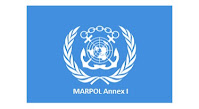- This regulation comes under MARPOL Annex I, Chapter 3 - Requirements for Machinery Spaces of All Ships, Part C - Control of Operational Discharge of Oil, Regulation 15.
General Requirements:
- Any discharge into the Sea of oil or oily mixture from the ships shall be prohibited.
- Whenever any visible traces of oil are observed on or below the surface of the water in the immediate vicinity of a ship or its wake, the Governments of parties should promptly investigate the facts bearing on the issue of whether there has been a violation of the provisions of this regulation.
- The investigation should include, in particular, the wind and sea conditions, the track and speed of the ship, other possible sources of the visible traces in the vicinity and any relevant oil discharge records.
- No discharge into the sea shall contain chemicals or other substances that are harmful to the marine environment.
- The oil residue which cannot be discharged into the sea in compliance with this regulation shall be retained on board for subsequent discharge to reception facilities.
Discharges outside Special Areas except in the Arctic waters:
- Any discharge into the sea of oil or oily mixture from ships of 400 gross tonnages and above shall be prohibited except when all the following conditions are satisfied:
- The ship is proceeding en route.
- The oily mixture is processed through oil filtering equipment meeting the requirements of Regulation 14* of this Annex.
- The oil content of the effluent without dilution does not exceed 15 parts per million.
- The oily mixture does not originate from cargo pump room bilges on Oil tankers.
- The oily mixture, incase of Oil tankers, is not mixed with oil cargo residues.
(* - Oil filtering equipment shall ensure that any oily mixture discharged into the sea after passing through the system has an oil content not exceeding 15 parts per million.)
Discharges in Special Areas:
- Any discharge into the sea of oil or oily mixture from ships of 400 gross tonnages and above shall be prohibited except when all the following conditions are satisfied:
- The ship is proceeding en route
- The oily mixture is processed through oil filtering equipment meeting the requirements of Regulation 14** of this Annex.
- The oil content of the effluent without dilution does not exceed 15 parts per million.
- The oily mixture does not originate from cargo pump room bilges on Oil tankers.
- The oily mixture, incase of Oil tankers, is not mixed with oil cargo residues.
- In respect to the Antarctic Area, any discharge into the sea of oil or oily mixture from the ship shall be prohibited.
(** - Oil filtering equipment shall also be provided with arrangements to ensure that any discharge of oily mixtures is automatically stopped when the oil content of the effluent exceeds 15 parts per million)
Requirements for ships of less than 400 gross tonnages in all areas except the Antarctic area and Arctic waters:
- In the case of a ship of less than 400 gross tonnages, oil and all oily mixtures shall either be retained on board for subsequent discharge to reception facilities or discharged into the sea in accordance with the following provisions:
- The ship is proceeding en route.
- The ship has in operation equipment of a design approved by the Administration that ensures that the oil content of the effluent without dilution does not exceed 15 parts per million.
- The oily mixture does not originate from cargo pump room bilges on Oil tankers.
- The oily mixture, incase of Oil tankers, is not mixed with oil cargo residues.
To download this article click the button below👇
Reference: IMO Publications & Documents - International Conventions - MARPOL - Annex I







0 Comments
Thanks for your Valuable comments and Suggestions